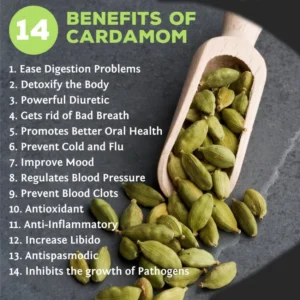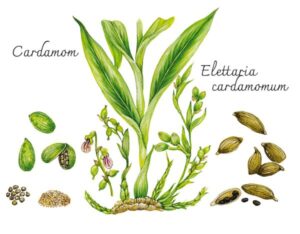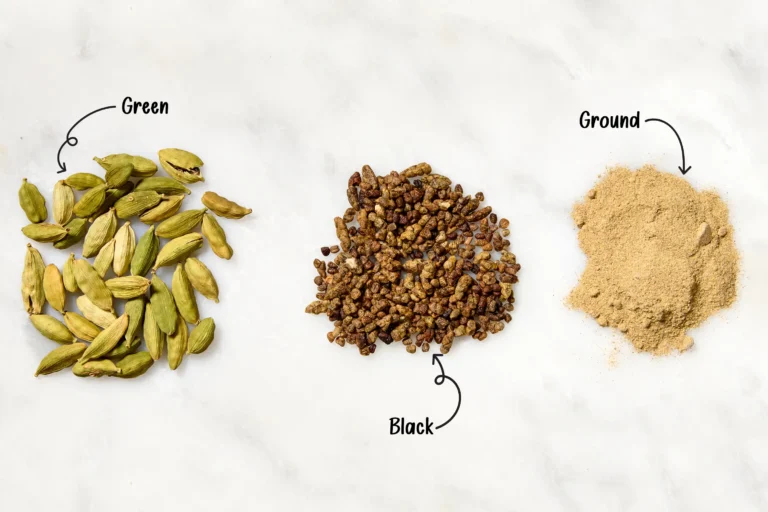Cardamom: The Queen of Spices
 Cardamom, often hailed as the “queen of spices,” is a aromatic treasure that has captivated palates and healers for millennia. This small, yet potent spice comes from the seeds of plants in the ginger family, primarily Elettaria cardamomum. Its unique flavor profile and versatile applications have made it a staple in cuisines and traditional medicine systems worldwide.Different Names:Cardamom goes by many names across cultures, reflecting its global popularity:
Cardamom, often hailed as the “queen of spices,” is a aromatic treasure that has captivated palates and healers for millennia. This small, yet potent spice comes from the seeds of plants in the ginger family, primarily Elettaria cardamomum. Its unique flavor profile and versatile applications have made it a staple in cuisines and traditional medicine systems worldwide.Different Names:Cardamom goes by many names across cultures, reflecting its global popularity:
- Elaichi (Hindi)
- Hal (Arabic)
- Kakula (Sanskrit)
- Bai Dou Kou (Chinese)
- Kardamomi (Greek)
- Cardamome (French)
- Kardamom (German)
Introduction:Native to the lush forests of southern India, cardamom has been cultivated for over 4,000 years. Its journey from the Cardamom Hills of Kerala to kitchens and apothecaries around the world is a testament to its enduring appeal. Today, while India remains a significant producer, Guatemala has emerged as the world’s largest exporter of this prized spice.Cardamom pods are small, triangular capsules containing numerous small, black seeds. It’s these seeds that harbor the spice’s intense aroma and flavor. Green cardamom is the most common variety, prized for its sweet, floral notes with hints of mint and lemon. Black cardamom, a different species, offers a smokier, more robust flavor profile.
Uses:
 Culinary Applications:
Culinary Applications:
- Baking: Adds warmth to breads, pastries, and Scandinavian treats
- Beverages: Flavors chai, coffee, and mulled wines
- Savory dishes: Enhances curries, rice dishes, and meat preparations
- Spice blends: Key ingredient in garam masala and other mixes
- Confectionery: Used in candies and chocolates
Medicinal and Ayurvedic Uses:
- Digestive aid: Helps alleviate bloating and indigestion
- Oral health: Freshens breath and may help fight oral bacteria
- Aromatherapy: Used in essential oils for relaxation
- Traditional medicine: Addresses various ailments in Ayurveda and other systems
 Benefits:
Benefits:
- Antioxidant Powerhouse: Rich in compounds that combat oxidative stress and inflammation
- Digestive Health: Stimulates digestive enzymes, potentially easing common gastrointestinal issues
- Oral Health: May help fight bacteria responsible for bad breath and cavities
- Heart Health: Some studies suggest potential benefits for blood pressure and cholesterol levels
- Blood Sugar Management: May help regulate glucose levels, beneficial for those with or at risk of type 2 diabetes
- Liver Protection: Animal studies indicate possible hepatoprotective properties
- Anti-inflammatory: May help reduce inflammation throughout the body
- Antimicrobial: Exhibits activity against certain harmful bacteria and fungi
Cons and Side Effects:
While cardamom is generally safe when consumed in culinary amounts, there are some considerations:
- Medication Interactions: May interact with certain medications, particularly those affecting blood clotting or blood sugar levels
- Gallstone Risk: In rare cases, excessive consumption might increase the risk of gallstone formation in susceptible individuals
- Allergic Reactions: Some people may experience allergic reactions, though this is uncommon
- Pregnancy and Breastfeeding: While generally considered safe in food amounts, medicinal doses should be avoided without medical supervision
- Digestive Discomfort: In large amounts, it may cause stomach upset in sensitive individuals
- Cost: High-quality cardamom can be expensive, which may limit its use for some
In Ayurvedic tradition, cardamom is considered tri-doshic, meaning it can balance all three doshas (Vata, Pitta, and Kapha). It’s particularly valued for its ability to kindle digestive fire (agni) without aggravating Pitta.Cardamom’s versatility extends beyond the kitchen and medicine cabinet. Its aromatic properties make it a popular choice in perfumery and cosmetics. In some cultures, it’s chewed as a breath freshener and is believed to have aphrodisiac properties.Whether you’re sprinkling it into your morning coffee, adding depth to a savory dish, or exploring its potential health benefits, cardamom offers a world of aromatic possibilities. As with any herb or spice with medicinal properties, it’s wise to consult with a healthcare professional before using cardamom in therapeutic doses, especially if you have existing health conditions or are taking medications.Embrace the queen of spices in your culinary adventures and wellness routines, but remember that moderation is key to enjoying its benefits while avoiding potential side effects. Let cardamom’s enchanting aroma and flavor transport you to exotic lands and elevate your dishes to new heights of sophistication.



